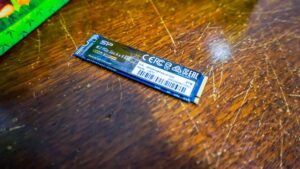Value royalty, however not the king

OUR VERDICT
The Silicon Power US70 is a fantastic drive that affords an inexpensive entry into the pace area of PCIe 4.Zero SSDs, but it’s not the quickest and even the cheapest offering these speeds.
FOR
- Economical PCIe 4.0
- Capacity advantage
- Endurance
AGAINST
- Economical looks
- No pace king
- Undercut by PNY
This is the system we used to test the Silicon Power US70
CPU: AMD Ryzen 5 3600X
CPU Cooler: AMD Wraith Spire
RAM: 32GB T-Force Vulcan Z CL18 @3,600MHz
Motherboard: MSI B550 Pro VDH Wi-Fi
Graphics card: EVGA GeForce RTX 2070 XC Gaming
OS SSD: Samsung 980 Pro @ 500GB
Power Supply: Thermaltake Toughpower GF1 750W
Case: ThermalTake Core V21
The variety of PCIe 4.0-based M.2 SSDs on the market is rising, they usually’re not all finances breakers anymore. While there are savage speedsters just like the Samsung 980 Pro and the WD Black SN850, there are now extra inexpensive choices that stability excessive pace with excessive worth, and that’s precisely what the Silicon Power US70 does.
The Silicon Power US70 affords as much as 2TB of storage for $320 (about £235, AU$420). It’s not the cheapest SSD, however you won’t discover too many that supply this sort of pace on this value vary. The Samsung 870 QVO affords inexpensive capability with a 2TB mannequin for $249 (£189, AU$279), but that SATA-based SSD doesn’t come near PCIe 3.0 SSD speeds, not to mention PCIe 4.0. Silicon Power’s pricing additionally retains it properly beneath the price of Samsung and WD’s premium drives, as a 2TB SN850 costs $450 and a 2TB 980 Pro prices $430. Silicon Power additionally stays properly beneath the 1TB choices for these drives.
Here’s how the Silicon Power US70 carried out in our suite of benchmark assessments:
CrystalDiskMark Sequential: 5,002.16MB/s (read); 4,256.9MB/s (write)
CrystalDiskMark Random Q32: 2,875.94MB/s (read); 2,628.63MB/s (write)
10GB file transfer: 4.56 seconds
10GB folder transfer: 5.73 seconds
PCMark10 SSD: 2,032 points

Of course, the lower pricing comes with a trade-off – the Silicon Power US70 isn’t as quick by a protracted shot. The 2TB Silicon Power US70 places up respectable sequential speeds at 5,002MB/s for reads and 4,256MB/s for writes. The Samsung 980 Pro and WD Black SN850 depart it behind with as much as 30% faster speeds. Samsung’s random speeds also outstrip the US70 considerably, particularly in random reads, the place it greater than doubles the US70’s efficiency.
But if the Samsung 980 Pro and WD Black SN850 are the sprinters, then the US70 is the marathon runner. We’d virtually count on to see one other trade-off in endurance given that the US70 is providing a whole lot of storage at a more budget-friendly value, however Silicon Power actually charges the US70 for 1,800 complete drive writes, which makes for 3,600TBW on the 2TB model. That’s triple the endurance of the 2TB 980 Pro and SN850, each of which offer 1,200TBW.
Given the pricing, anyone balancing their finances for pace and capability could take into consideration selecting one of many faster drives at a decrease capability than the US70, however a quicker drive could solely show to be faster whereas it’s principally empty. SSDs are likely to decelerate significantly as they refill and have much less house obtainable to make use of as a high-speed cache. Our associates at Tom’s Hardware report the US70 makes use of a 3rd of its obtainable house as a cache, so the 2TB drive is likely to hold cruising alongside at its full speeds when stuffed with a considerable amount of knowledge that would make a faster 1TB drive decelerate significantly.
The US70 sits in a reasonably secure place, but it does have some direct competitors. Though we have but to check both, each the Seagate FireCuda 520 and Corsair MP600 supply related speeds, endurance, and pricing (though each are a bit costlier on the time of writing). There’s additionally the PNY XLR8 CS3040, which is the identical value whereas offering barely quicker speeds and equal endurance, although, once more, we haven’t examined this drive.

Buy it if…
Your priority is speed with value coming in a close second
The Silicon Power US70 isn’t the quickest drive on the market, nevertheless it’s a giant step up from the older PCIe 3.0-based SSDs. And, it’s lots cheaper than the drives setting data, which makes it a powerful choice for value-oriented fanatics.
You plan to write a lot of data
The US70 can retailer a whole lot of knowledge, however what’s extra spectacular is what number of occasions you possibly can fill it up. Silicon Power charges it for 3,600TBW, so don’t fear about it dying in your pc any time quickly.
You cope with large files
The US70 stands out extra for its sequential speeds than its random speeds. While it’s all around quick, you’ll be higher served by it whereas coping with large recordsdata that reap the benefits of the 5,000MB/s throughput.
Don’t buy it if…
You need the quickest drive
5,000MB/s is quick, but SSDs can nonetheless go quicker. Samsung and Western Digital have proved it, and the Silicon Power US70 can’t sustain with these drives in a footrace.
You need the best deal
We suppose the Silicon Power US70 is nice, however PNY is correctly undercutting it with the CS3040 that goes just a bit decrease in value and a bit increased in speeds. Plus, they’re each an identical shade of blue that will wrestle to slot in with any build
You have an aesthetic build
Maybe your SSD might be hidden beneath a graphics card or a heatsink, but when it’s not, you then may need to keep away from the US70. It has an uncommon, blue PCB that’s going to face out and unlikely to match your different parts.